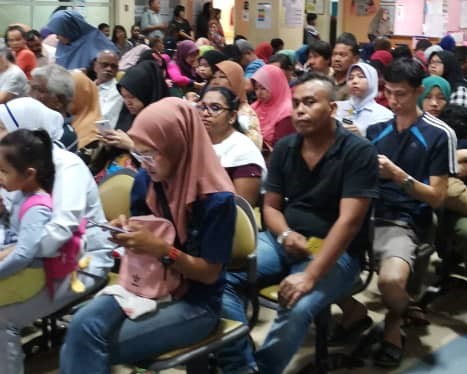KUALA LUMPUR, Sept 16 — Klang retiree Mrs Lee still has yet to get free hearing aids she had applied for under the Peka B40 government scheme four months ago.
And public hospital staff told her that she could only get one instead of a pair, for below RM2,000, despite the health programme’s lifetime limit of RM20,000 worth of medical devices that can be purchased by the bottom 40 per cent (B40) of income earners aged 40 and above for free.
The 73-year-old woman’s difficulties in obtaining medical aid from the Ministry of Health’s (MOH) signature screening plan for the older B40 illustrates gaps in the programme, which was initially touted as a private-led project for general practitioner (GP) clinics to provide free health tests to the poor, paid for by MOH.
Mrs Lee, who has been receiving B40 cash aid for some time now as both she and her late husband were retirees with no assets or income, had applied for new hearing aids under Peka B40 last May because of hearing troubles.
She registered at her local government clinic, Klinik Kesihatan Sungai Bertek in Klang, for the aids.
She was given an appointment for a full medical check-up in the same public health clinic in the following two weeks, with clinic staff explaining that they were short-staffed and unaware of the procedures as Mrs Lee was the first to apply for Peka B40 in the clinic.
Following the check-up, Mrs Lee waited another two weeks for the results.
Her son, Joe, deemed this as troublesome as Mrs Lee, just like many other senior citizens, goes for monthly medical check-ups in these government clinics, and therefore, her health records should already exist in the first place.
After a full medical check-up for the Peka B40 scheme, Mrs Lee, who had a pre-existing hearing condition, was referred to Hospital Tengku Ampuan Rahimah Klang to meet an otolaryngology specialist. She was again requested to book another appointment with the otolaryngology department of the public hospital, as the department could not handle the crowd on that day.
“The general hospitals are understaffed as it is, and unsure of the execution of Peka on all levels, and it’s like groping in the dark,” Joe told CodeBlue, referring to Hospital Tengku Ampuan Rahimah Klang.
“Elderly and B40 folks can hardly stomach the numerous appointments spaced weeks apart, in different locations, with numerous hours of waiting.”
Joe Lee, son of a 73-year-old B40 patient
During the appointment with the otolaryngology department last September 3, and following evaluations, it was revealed that while the hearing on Mrs Lee’s right ear could be salvaged, it might not be possible for the left ear.
“It was then that one of the personnel in the audio department told me that since my mother was above 70, she could only get ONE hearing aid (my mom is facing issues with both). She also relayed that that ONE hearing aid was capped, not exceeding RM2,000.
“Apparently, these are ‘new regulations’ that just came into place. All these fine prints were never stated, and just suddenly put in place,” claimed Joe.
According to the Peka B40 website, the maximum lifetime limit for the medical equipment benefit is set at RM20,000, which also includes hearing aids.
Medical Device’s Valuation Based On Standard MOH Rates
CodeBlue approached Deputy Health Minister Dr Lee Boon Chye for clarification on Mrs Lee’s case.
“Under Peka B40 programme, the limit for device is RM20,000. However, the valuation of the device is based on the standard valuation in MOH hospitals.
“As to why one instead of both sides (of Mrs Lee’s ears), it depends on the doctor who treated the patient. This is the decision by the treating doctor and NOT the policy of Peka B40 team. Hence, we use MOH guideline to provide basic need for hearing aids and other equipment,” Dr Lee explained.
He further stated that even hearing aids have different prices depending on the type, quality and specifications, and the amount for each aid is based on the existing rate by MOH.
Denying alleged regulations that only one hearing aid can be provided for citizens aged 70 and above, Dr Lee explained that anyone can receive aids on both ears, depending solely on what the doctor prescribes.
But the fact prevails that despite having existing medical records in clinics, these elderly citizens do have to undergo prolonged waiting periods, multiple appointments, and overcrowded hospitals to get the medical aid they deserve.
Dr Lee said the objective of Peka B40 was to “encourage comprehensive health screening among B40 folks, as high percentage of conditions such as diabetes and hyperthyroidism were either undiagnosed, untreated or not well treated.”
Peka B40’s website also spells out the same, saying that a full medical assessment is needed for recipients to be eligible for the medical device aid.
Mrs Lee is now slated for an appointment on September 18 for the fitting of her hearing aid.
The Peka B40 pilot programme, which was launched last April, provides free health screenings like blood and urine tests to check blood sugar and cholesterol levels, physical exam and mental health screening, as well as breast and prostate exams for women and men; aid to purchase medical devices; incentives to complete cancer treatment at MOH hospitals; and transport aid to get treatment at MOH hospitals.
In August, the programme was opened to include poor Malaysians aged 40 and above after hitting only 5 per cent of its target. This was due to the lukewarm response to the initiative, which had so far screened only 40,119 people, just 5 per cent of this year’s target of 800,000.
Health Minister Dzulkefly Ahmad previously mentioned that 69 per cent of Peka B40 screenings were done at private GP clinics, with the remaining 31 per cent at public health clinics.
Seven-Page Forms For Doctors
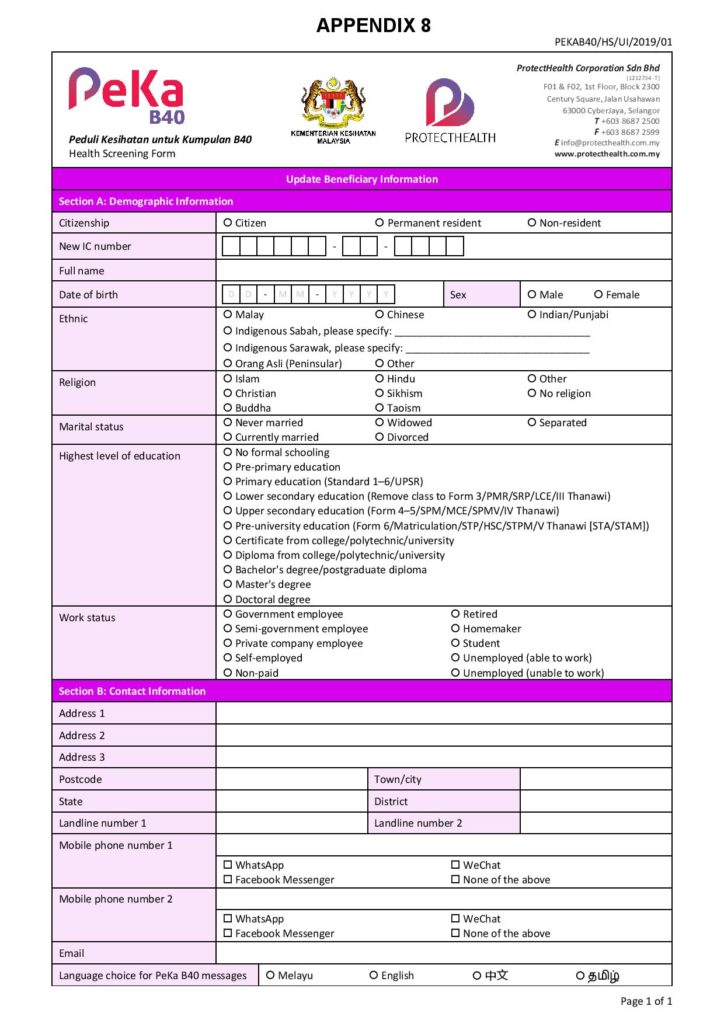
Peka B40 health screening form that doctors are required to complete for beneficiaries undergoing health screening (Page 1). 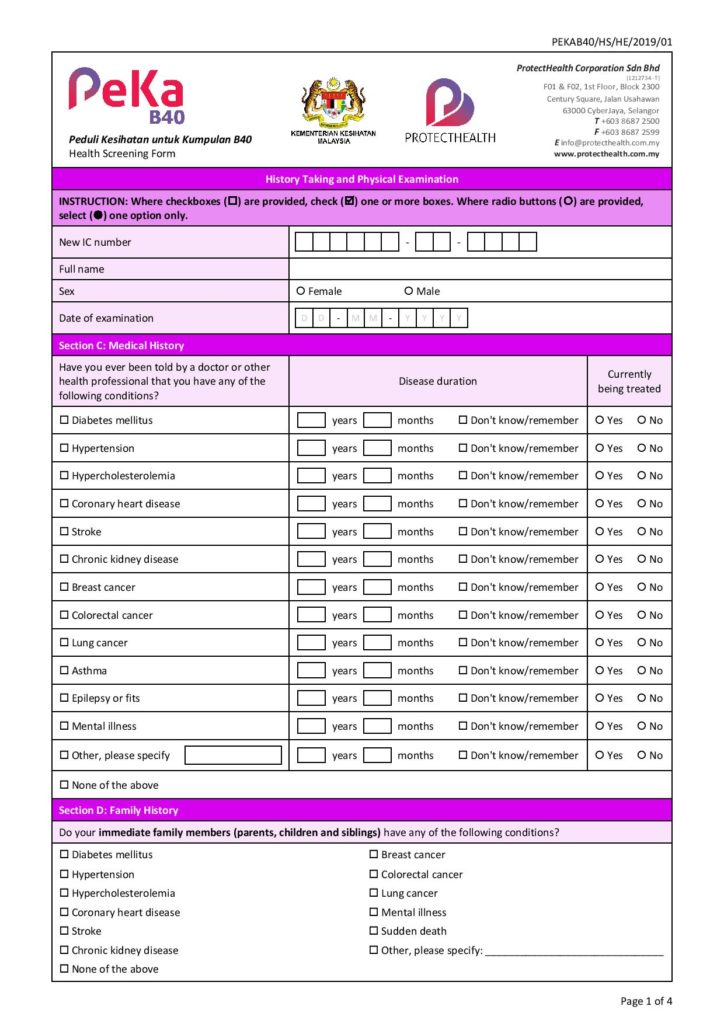
Peka B40 health screening form that doctors are required to complete for beneficiaries undergoing health screening (Page 2). 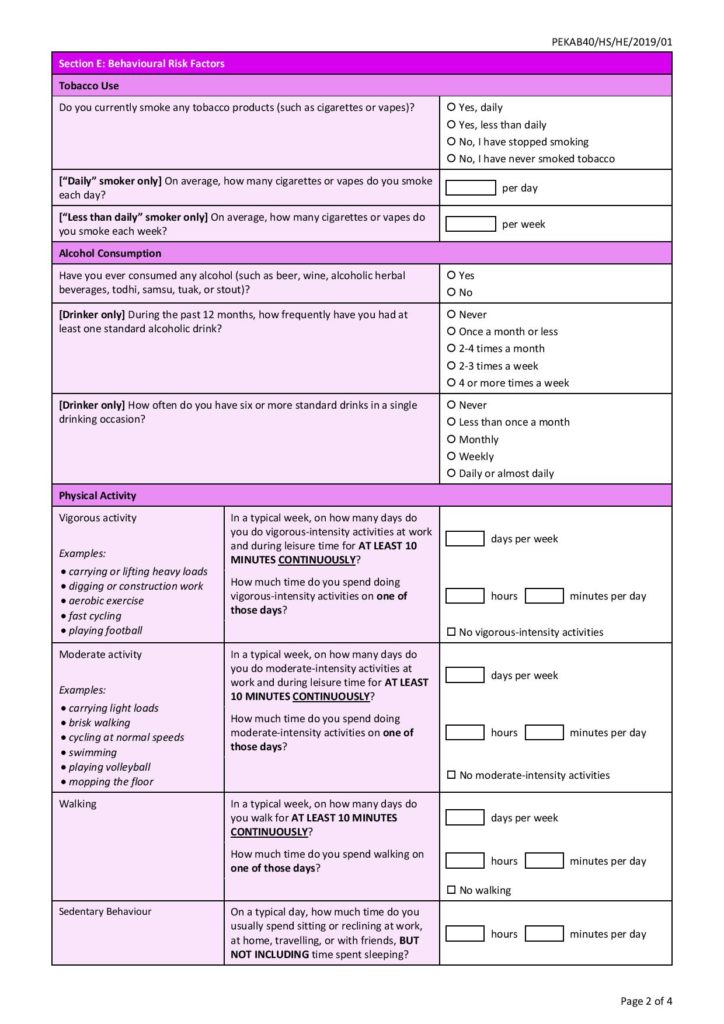
Peka B40 health screening form that doctors are required to complete for beneficiaries undergoing health screening (Page 3). 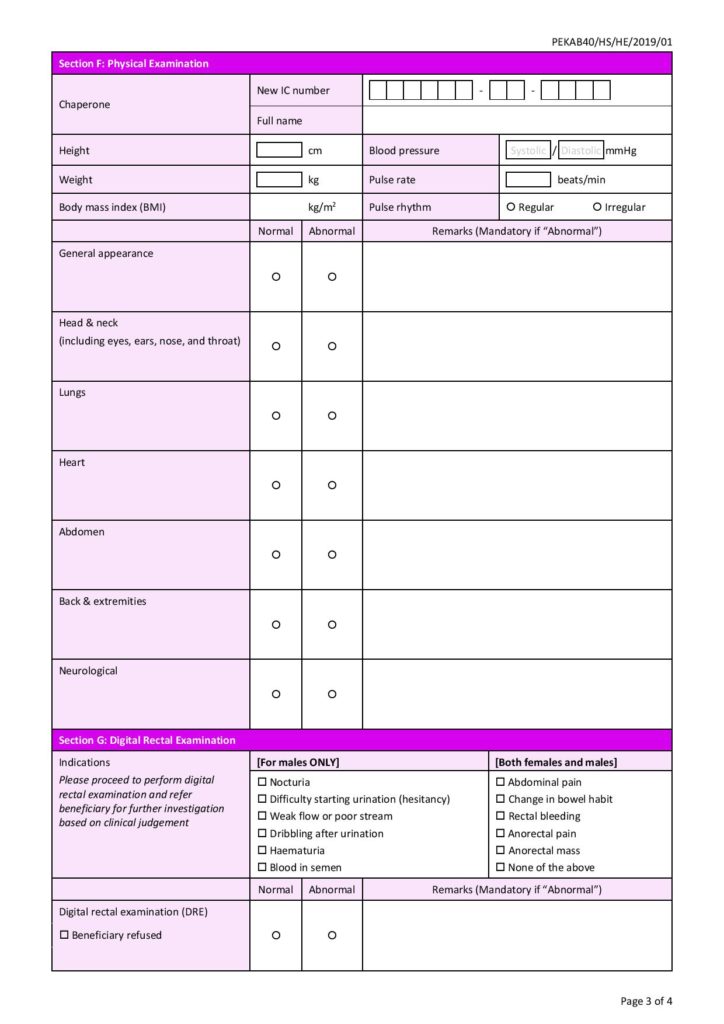
Peka B40 health screening form that doctors are required to complete for beneficiaries undergoing health screening (Page 4). 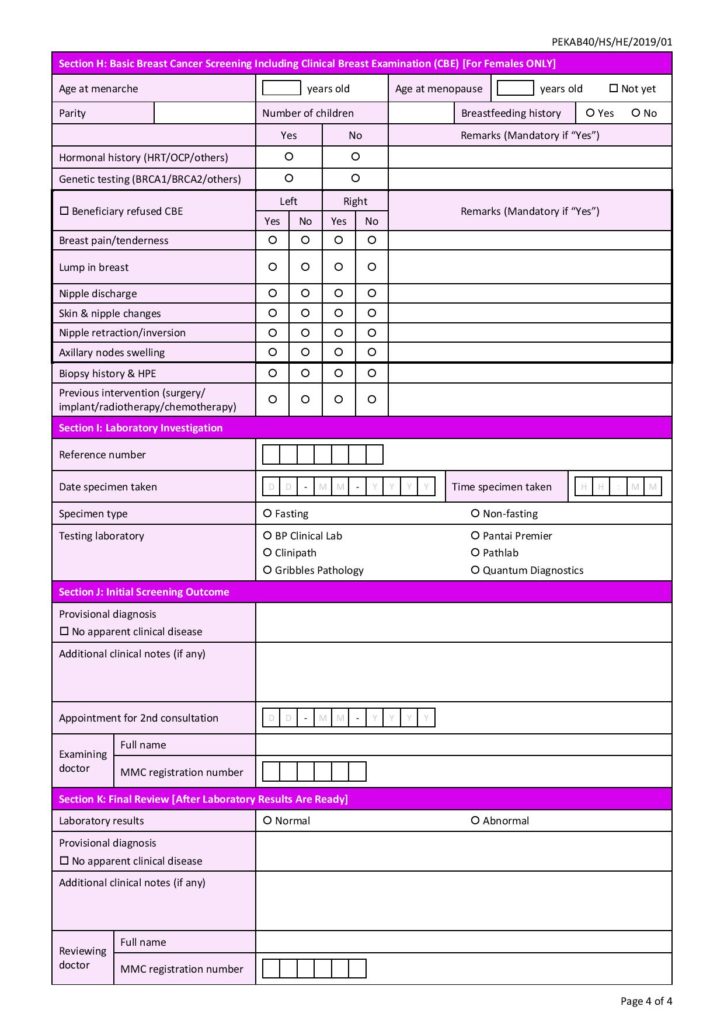
Peka B40 health screening form that doctors are required to complete for beneficiaries undergoing health screening (Page 5). 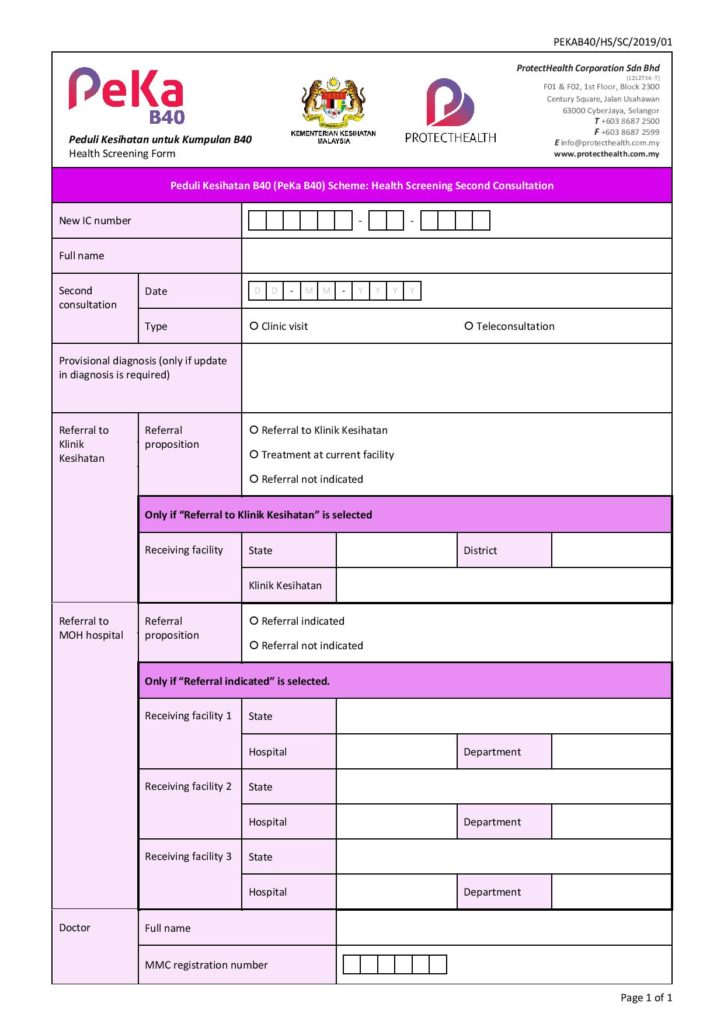
Peka B40 health screening form that doctors are required to complete for beneficiaries undergoing health screening — form for the second consultation. 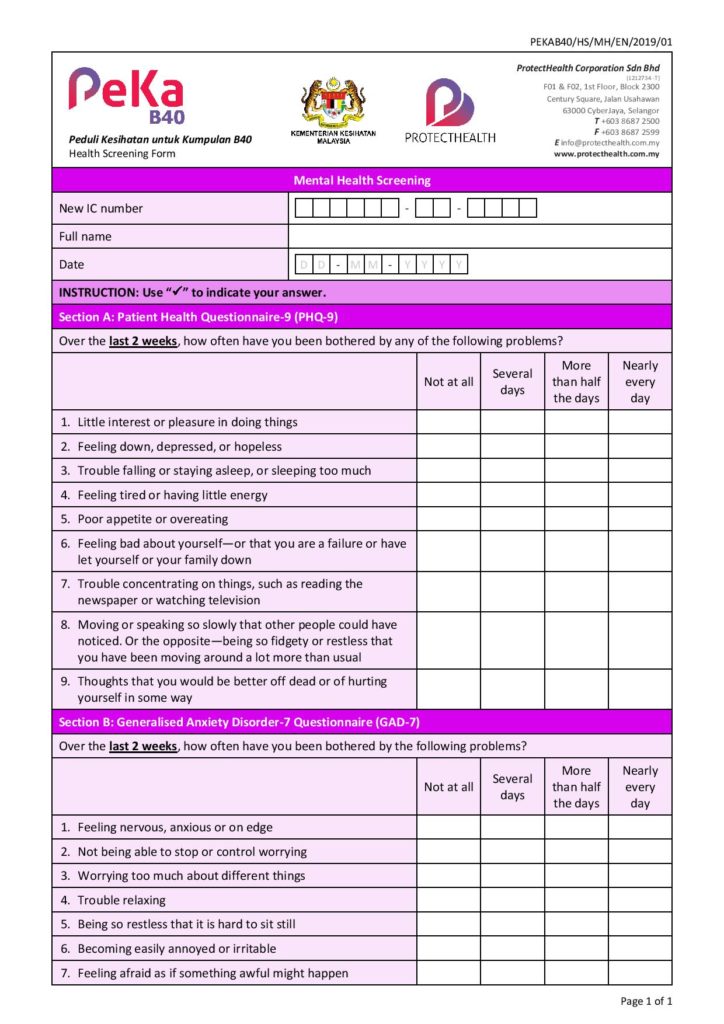
Peka B40 health screening form that doctors are required to complete for beneficiaries undergoing health screening — form for the mental health screening.
Several doctors have also complained about having to fill out long forms for Peka B40 beneficiaries running into seven pages.
Former Malaysian Medical Association (MMA) president Dr Milton Lum told CodeBlue that he has received 10 complaints about the administrative work for doctors screening people under the scheme.
Federation of Private Medical Practitioners’ Associations Malaysia (FPMPAM) honorary secretary Dr G. Shanmuganathan quoted a doctor from Penang as telling him: “It is so cumbersome that my doctors are not willing to do it. Give up.”
The Peka B40 health screening form sighted by CodeBlue requires doctors to fill in five pages of information on those undergoing tests during their first visit, and one page each on the second consultation and mental health screening.
The data required includes the beneficiary’s race, religion, education level, work status, address, phone number, social media platform, medical history involving 12 diseases, family history of 11 conditions, tobacco use, alcohol consumption, physical activity, physical condition of various body parts, and data from rectal and breast examinations.
The one-page mental health questionnaire asks patients questions about how often they are bothered by problems like feeling depressed, poor appetite, or self-harming thoughts, as well as questions related to generalised anxiety disorder.
According to the Peka B40 consent and declaration form, beneficiaries’ personal data is given to ProtectHealth Corporation Sdn Bhd, described on its website as a wholly-owned subsidiary of ProtectHealth Malaysia under MOH that is the “health care scheme administrator” for Peka B40.
ProtectHealth’s mission, as stated on its website, is to introduce “innovative health financing mechanisms” and to provide “an equitable, effective and efficient source of funding to supplement mainstream public funding for health care”.
Boo Su-Lyn contributed to this report.


